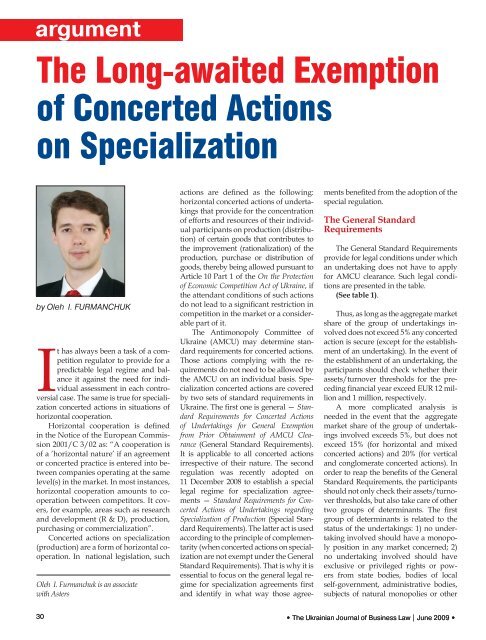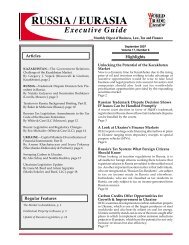The Long awaited Exemption of Concerted Actions on ... - Asters
The Long awaited Exemption of Concerted Actions on ... - Asters
The Long awaited Exemption of Concerted Actions on ... - Asters
You also want an ePaper? Increase the reach of your titles
YUMPU automatically turns print PDFs into web optimized ePapers that Google loves.
It has always been a task <str<strong>on</strong>g>of</str<strong>on</strong>g> a competiti<strong>on</strong><br />
regulator to provide for a<br />
predictable legal regime and balance<br />
it against the need for individual<br />
assessment in each c<strong>on</strong>troversial<br />
case. <str<strong>on</strong>g>The</str<strong>on</strong>g> same is true for specializati<strong>on</strong><br />
c<strong>on</strong>certed acti<strong>on</strong>s in situati<strong>on</strong>s <str<strong>on</strong>g>of</str<strong>on</strong>g><br />
horiz<strong>on</strong>tal cooperati<strong>on</strong>.<br />
<br />
in the Notice <str<strong>on</strong>g>of</str<strong>on</strong>g> the European Commissi<strong>on</strong><br />
2001/C 3/02 as: “A cooperati<strong>on</strong> is<br />
<str<strong>on</strong>g>of</str<strong>on</strong>g> a ’horiz<strong>on</strong>tal nature’ if an agreement<br />
or c<strong>on</strong>certed practice is entered into between<br />
companies operating at the same<br />
level(s) in the market. In most instances,<br />
horiz<strong>on</strong>tal cooperati<strong>on</strong> amounts to cooperati<strong>on</strong><br />
between competitors. It covers,<br />
for example, areas such as research<br />
and development (R & D), producti<strong>on</strong>,<br />
purchasing or commercializati<strong>on</strong>”.<br />
<str<strong>on</strong>g>C<strong>on</strong>certed</str<strong>on</strong>g> acti<strong>on</strong>s <strong>on</strong> specializati<strong>on</strong><br />
(producti<strong>on</strong>) are a form <str<strong>on</strong>g>of</str<strong>on</strong>g> horiz<strong>on</strong>tal cooperati<strong>on</strong>.<br />
In nati<strong>on</strong>al legislati<strong>on</strong>, such<br />
Oleh I. Furmanchuk is an associate<br />
with <strong>Asters</strong><br />
<br />
horiz<strong>on</strong>tal c<strong>on</strong>certed acti<strong>on</strong>s <str<strong>on</strong>g>of</str<strong>on</strong>g> undertakings<br />
that provide for the c<strong>on</strong>centrati<strong>on</strong><br />
<str<strong>on</strong>g>of</str<strong>on</strong>g> efforts and resources <str<strong>on</strong>g>of</str<strong>on</strong>g> their individual<br />
participants <strong>on</strong> producti<strong>on</strong> (distributi<strong>on</strong>)<br />
<str<strong>on</strong>g>of</str<strong>on</strong>g> certain goods that c<strong>on</strong>tributes to<br />
the improvement (rati<strong>on</strong>alizati<strong>on</strong>) <str<strong>on</strong>g>of</str<strong>on</strong>g> the<br />
producti<strong>on</strong>, purchase or distributi<strong>on</strong> <str<strong>on</strong>g>of</str<strong>on</strong>g><br />
goods, thereby being allowed pursuant to<br />
Article 10 Part 1 <str<strong>on</strong>g>of</str<strong>on</strong>g> the On the Protecti<strong>on</strong><br />
<str<strong>on</strong>g>of</str<strong>on</strong>g> Ec<strong>on</strong>omic Competiti<strong>on</strong> Act <str<strong>on</strong>g>of</str<strong>on</strong>g> Ukraine, if<br />
the attendant c<strong>on</strong>diti<strong>on</strong>s <str<strong>on</strong>g>of</str<strong>on</strong>g> such acti<strong>on</strong>s<br />
<br />
competiti<strong>on</strong> in the market or a c<strong>on</strong>siderable<br />
part <str<strong>on</strong>g>of</str<strong>on</strong>g> it.<br />
<str<strong>on</strong>g>The</str<strong>on</strong>g> Antim<strong>on</strong>opoly Committee <str<strong>on</strong>g>of</str<strong>on</strong>g><br />
Ukraine (AMCU) may determine standard<br />
requirements for c<strong>on</strong>certed acti<strong>on</strong>s.<br />
Those acti<strong>on</strong>s complying with the requirements<br />
do not need to be allowed by<br />
the AMCU <strong>on</strong> an individual basis. Specializati<strong>on</strong><br />
c<strong>on</strong>certed acti<strong>on</strong>s are covered<br />
by two sets <str<strong>on</strong>g>of</str<strong>on</strong>g> standard requirements in<br />
Standard<br />
Requirements for <str<strong>on</strong>g>C<strong>on</strong>certed</str<strong>on</strong>g> <str<strong>on</strong>g>Acti<strong>on</strong>s</str<strong>on</strong>g><br />
<str<strong>on</strong>g>of</str<strong>on</strong>g> Undertakings for General <str<strong>on</strong>g>Exempti<strong>on</strong></str<strong>on</strong>g><br />
from Prior Obtainment <str<strong>on</strong>g>of</str<strong>on</strong>g> AMCU Clearance<br />
(General Standard Requirements).<br />
It is applicable to all c<strong>on</strong>certed acti<strong>on</strong>s<br />
irrespective <str<strong>on</strong>g>of</str<strong>on</strong>g> their nature. <str<strong>on</strong>g>The</str<strong>on</strong>g> sec<strong>on</strong>d<br />
regulati<strong>on</strong> was recently adopted <strong>on</strong><br />
11 December 2008 to establish a special<br />
legal regime for specializati<strong>on</strong> agree-<br />
Standard Requirements for <str<strong>on</strong>g>C<strong>on</strong>certed</str<strong>on</strong>g><br />
<str<strong>on</strong>g>Acti<strong>on</strong>s</str<strong>on</strong>g> <str<strong>on</strong>g>of</str<strong>on</strong>g> Undertakings regarding<br />
Specializati<strong>on</strong> <str<strong>on</strong>g>of</str<strong>on</strong>g> Producti<strong>on</strong> (Special Standard<br />
Requirements). <str<strong>on</strong>g>The</str<strong>on</strong>g> latter act is used<br />
according to the principle <str<strong>on</strong>g>of</str<strong>on</strong>g> complementarity<br />
(when c<strong>on</strong>certed acti<strong>on</strong>s <strong>on</strong> specializati<strong>on</strong><br />
are not exempt under the General<br />
Standard Requirements). That is why it is<br />
essential to focus <strong>on</strong> the general legal re-<br />
<br />
and identify in what way those agree-<br />
<br />
special regulati<strong>on</strong>.<br />
<str<strong>on</strong>g>The</str<strong>on</strong>g> General Standard<br />
Requirements<br />
<str<strong>on</strong>g>The</str<strong>on</strong>g> General Standard Requirements<br />
provide for legal c<strong>on</strong>diti<strong>on</strong>s under which<br />
an undertaking does not have to apply<br />
for AMCU clearance. Such legal c<strong>on</strong>diti<strong>on</strong>s<br />
are presented in the table.<br />
(See table 1).<br />
Thus, as l<strong>on</strong>g as the aggregate market<br />
share <str<strong>on</strong>g>of</str<strong>on</strong>g> the group <str<strong>on</strong>g>of</str<strong>on</strong>g> undertakings involved<br />
does not exceed 5% any c<strong>on</strong>certed<br />
acti<strong>on</strong> is secure (except for the establishment<br />
<str<strong>on</strong>g>of</str<strong>on</strong>g> an undertaking). In the event <str<strong>on</strong>g>of</str<strong>on</strong>g><br />
the establishment <str<strong>on</strong>g>of</str<strong>on</strong>g> an undertaking, the<br />
participants should check whether their<br />
assets/turnover thresholds for the pre-<br />
li<strong>on</strong><br />
and 1 milli<strong>on</strong>, respectively.<br />
A more complicated analysis is<br />
needed in the event that the aggregate<br />
market share <str<strong>on</strong>g>of</str<strong>on</strong>g> the group <str<strong>on</strong>g>of</str<strong>on</strong>g> undertakings<br />
involved exceeds 5%, but does not<br />
exceed 15% (for horiz<strong>on</strong>tal and mixed<br />
c<strong>on</strong>certed acti<strong>on</strong>s) and 20% (for vertical<br />
and c<strong>on</strong>glomerate c<strong>on</strong>certed acti<strong>on</strong>s). In<br />
<br />
Standard Requirements, the participants<br />
should not <strong>on</strong>ly check their assets/turnover<br />
thresholds, but also take care <str<strong>on</strong>g>of</str<strong>on</strong>g> other<br />
<br />
group <str<strong>on</strong>g>of</str<strong>on</strong>g> determinants is related to the<br />
status <str<strong>on</strong>g>of</str<strong>on</strong>g> the undertakings: 1) no undertaking<br />
involved should have a m<strong>on</strong>opoly<br />
positi<strong>on</strong> in any market c<strong>on</strong>cerned; 2)<br />
no undertaking involved should have<br />
exclusive or privileged rights or powers<br />
from state bodies, bodies <str<strong>on</strong>g>of</str<strong>on</strong>g> local<br />
self-government, administrative bodies,<br />
subjects <str<strong>on</strong>g>of</str<strong>on</strong>g> natural m<strong>on</strong>opolies or other
m<strong>on</strong>opoly entities. <str<strong>on</strong>g>The</str<strong>on</strong>g> sec<strong>on</strong>d group <str<strong>on</strong>g>of</str<strong>on</strong>g><br />
determinants is related to the potential<br />
c<strong>on</strong>sequences <str<strong>on</strong>g>of</str<strong>on</strong>g> c<strong>on</strong>certed acti<strong>on</strong>s. Such<br />
<br />
certed<br />
acti<strong>on</strong>s; 2) limitati<strong>on</strong> <strong>on</strong> sales or<br />
purchase volumes; or 3) the allocati<strong>on</strong> <str<strong>on</strong>g>of</str<strong>on</strong>g><br />
markets, sellers, buyers or c<strong>on</strong>sumers.<br />
<br />
framework: if the market share is below<br />
15% / 20%, the undertakings c<strong>on</strong>cerned,<br />
being n<strong>on</strong>-dominant <strong>on</strong>es, should effect<br />
the c<strong>on</strong>certed acti<strong>on</strong>s in a way to avoid<br />
harmful c<strong>on</strong>sequences for the market.<br />
However, as l<strong>on</strong>g as there are no guidelines<br />
<strong>on</strong> assessment <str<strong>on</strong>g>of</str<strong>on</strong>g> probable harmful<br />
effect by the AMCU, the parties may not<br />
be sure that their self-assessment is in line<br />
with the understanding <str<strong>on</strong>g>of</str<strong>on</strong>g> the AMCU <strong>on</strong><br />
the applicati<strong>on</strong> <str<strong>on</strong>g>of</str<strong>on</strong>g> the relevant rules. Virtually<br />
any c<strong>on</strong>certed acti<strong>on</strong> may evoke<br />
<br />
from the General Standard Requirements<br />
in the event that the aggregate market<br />
share <str<strong>on</strong>g>of</str<strong>on</strong>g> the undertakings involved exceeds<br />
5%. As a practical matter, this means that<br />
the parties to the c<strong>on</strong>certed acti<strong>on</strong>s should<br />
apply for the opini<strong>on</strong> <str<strong>on</strong>g>of</str<strong>on</strong>g> the AMCU to be<br />
<strong>on</strong> the safe side while c<strong>on</strong>ducting such acti<strong>on</strong>s.<br />
An applicati<strong>on</strong> for clearance is not<br />
Table 1. <str<strong>on</strong>g>The</str<strong>on</strong>g> General Standard C<strong>on</strong>diti<strong>on</strong>s for <str<strong>on</strong>g>Exempti<strong>on</strong></str<strong>on</strong>g><br />
from Prior AMCU Clearance*<br />
No.<br />
1.<br />
Aggregate<br />
market<br />
share<br />
A&B**<br />
< 5%<br />
2. A&B EUR 12 mln – worldwide<br />
for A&B in total; and<br />
2) > EUR 1 mln – worldwide<br />
for each A and B; and<br />
3) > EUR 1 mln – in<br />
Ukraine for either A or B<br />
at least <strong>on</strong>e threshold is<br />
not met:<br />
1) > EUR 12 mln – worldwide<br />
for A&B in total; or<br />
2) > EUR 1 mln – worldwide<br />
for each A and B; or<br />
3) > EUR 1 mln – in<br />
Ukraine for either A or B<br />
all thresholds are met:<br />
1) > EUR 12 mln – worldwide<br />
for A&B in total; and<br />
2) > EUR 1 mln – worldwide<br />
for each A and B; and<br />
3) > EUR 1 mln – in<br />
Ukraine for either A or B<br />
thresholds are not<br />
relevant<br />
establishment <str<strong>on</strong>g>of</str<strong>on</strong>g> an undertaking<br />
no c<strong>on</strong>diti<strong>on</strong> is present:<br />
1) m<strong>on</strong>opoly positi<strong>on</strong>;<br />
2) exclusive or privileged rights<br />
from state, local self-government<br />
or subjects <str<strong>on</strong>g>of</str<strong>on</strong>g> natural m<strong>on</strong>opoly;<br />
<br />
4) may lead to the limitati<strong>on</strong> <str<strong>on</strong>g>of</str<strong>on</strong>g><br />
sales or purchase;<br />
5) may lead to the allocati<strong>on</strong> <str<strong>on</strong>g>of</str<strong>on</strong>g><br />
markets, sellers, buyers or c<strong>on</strong>sumers<br />
other c<strong>on</strong>diti<strong>on</strong>s are not relevant<br />
any c<strong>on</strong>diti<strong>on</strong> is present:<br />
1) m<strong>on</strong>opoly positi<strong>on</strong>;<br />
2) exclusive or privileged rights<br />
or powers from state, local selfgovernment<br />
or subjects <str<strong>on</strong>g>of</str<strong>on</strong>g> natural<br />
m<strong>on</strong>opoly;<br />
<br />
4) may lead to the limitati<strong>on</strong> <str<strong>on</strong>g>of</str<strong>on</strong>g><br />
sales or purchase;<br />
5) may lead to the allocati<strong>on</strong> <str<strong>on</strong>g>of</str<strong>on</strong>g><br />
markets, sellers, buyers or c<strong>on</strong>sumers<br />
Prior<br />
AMCU<br />
clearance<br />
not<br />
required<br />
required<br />
not<br />
required<br />
required<br />
required<br />
A&B ><br />
6.<br />
––––––– ––––––– required<br />
15/20%<br />
<br />
** A and B – groups <str<strong>on</strong>g>of</str<strong>on</strong>g> undertakings the participants <str<strong>on</strong>g>of</str<strong>on</strong>g> the c<strong>on</strong>certed acti<strong>on</strong>s bel<strong>on</strong>g to.<br />
*** 15% for horiz<strong>on</strong>tal and mixed c<strong>on</strong>certed acti<strong>on</strong>s, 20% for vertical and c<strong>on</strong>glomerate c<strong>on</strong>certed<br />
acti<strong>on</strong>s.<br />
required if the undertakings have an aggregate<br />
market share <str<strong>on</strong>g>of</str<strong>on</strong>g> 5% or less in any<br />
market c<strong>on</strong>cerned. It is presumed that no<br />
harmful c<strong>on</strong>sequences may arise (except<br />
for the situati<strong>on</strong> <str<strong>on</strong>g>of</str<strong>on</strong>g> an establishment <str<strong>on</strong>g>of</str<strong>on</strong>g> an<br />
undertaking) for the market.<br />
<str<strong>on</strong>g>The</str<strong>on</strong>g> Special Standard<br />
Requirements<br />
General Descripti<strong>on</strong><br />
<str<strong>on</strong>g>The</str<strong>on</strong>g> Special Standard Requirements<br />
were <strong>on</strong>ly adopted quite recently. That<br />
is why the practice <str<strong>on</strong>g>of</str<strong>on</strong>g> their applicati<strong>on</strong><br />
still has to be developed. <str<strong>on</strong>g>The</str<strong>on</strong>g> main<br />
ments<br />
is the abolishing <str<strong>on</strong>g>of</str<strong>on</strong>g> the quantitative<br />
thresholds <str<strong>on</strong>g>of</str<strong>on</strong>g> EUR 12 milli<strong>on</strong> and<br />
ti<strong>on</strong><br />
<str<strong>on</strong>g>of</str<strong>on</strong>g> the market share threshold to 25%<br />
for specializati<strong>on</strong> agreements, though<br />
with certain limitati<strong>on</strong>s. <str<strong>on</strong>g>The</str<strong>on</strong>g> Special<br />
Standard Requirements do not apply if<br />
any participant in c<strong>on</strong>certed acti<strong>on</strong>s occupies<br />
a m<strong>on</strong>opoly (dominant) positi<strong>on</strong><br />
in any market c<strong>on</strong>cerned, which is in<br />
line with the prohibiti<strong>on</strong> in the General<br />
Standard Requirements (if the aggregate<br />
market share exceeds 5%).<br />
<str<strong>on</strong>g>The</str<strong>on</strong>g> regulati<strong>on</strong> resembles Commissi<strong>on</strong><br />
Regulati<strong>on</strong> (EC) No.2658/2000 <str<strong>on</strong>g>of</str<strong>on</strong>g><br />
29 November 2000 <strong>on</strong> the applicati<strong>on</strong> <str<strong>on</strong>g>of</str<strong>on</strong>g><br />
Article 81(3) <str<strong>on</strong>g>of</str<strong>on</strong>g> the Treaty to categories<br />
<str<strong>on</strong>g>of</str<strong>on</strong>g> specializati<strong>on</strong> agreements (hereinafter<br />
<br />
That legal act also dispenses with quantitative<br />
thresholds and sets the presumpti<strong>on</strong><br />
that participating undertakings do<br />
not need individual clearance if their<br />
combined market share does not exceed<br />
20% <str<strong>on</strong>g>of</str<strong>on</strong>g> the relevant market.<br />
At the same time, certain provisi<strong>on</strong>s<br />
<str<strong>on</strong>g>of</str<strong>on</strong>g> the Special Standard Requirements do<br />
not make it possible for the specializa-<br />
<br />
special legal regime, leaving them for the<br />
less favorable general regime <str<strong>on</strong>g>of</str<strong>on</strong>g> exempti<strong>on</strong><br />
from prior AMCU clearance.<br />
<br />
<br />
maximum time limit for specializati<strong>on</strong><br />
<br />
Standard Requirements. All agreements<br />
exceeding that durati<strong>on</strong> should be assessed<br />
using the General Standard Requirements.<br />
However, such a l<strong>on</strong>g-term<br />
agreement does not appear to be a viable<br />
opti<strong>on</strong>, because there is a high probability<br />
that the AMCU will c<strong>on</strong>sider it as bring-
ing about (or capable <str<strong>on</strong>g>of</str<strong>on</strong>g> bringing about)<br />
harmful c<strong>on</strong>sequences due to the l<strong>on</strong>g<br />
durati<strong>on</strong>. That is why, in fact, the setting<br />
ti<strong>on</strong><br />
agreements does not devoid such<br />
<br />
the General Standard Requirements. In<br />
the European Specializati<strong>on</strong> Regulati<strong>on</strong>,<br />
the absence <str<strong>on</strong>g>of</str<strong>on</strong>g> any term is countervailed<br />
by the its inapplicability to agreements<br />
<br />
prices, the limitati<strong>on</strong> <str<strong>on</strong>g>of</str<strong>on</strong>g> output or sales or<br />
the allocati<strong>on</strong> <str<strong>on</strong>g>of</str<strong>on</strong>g> markets or customers.<br />
<str<strong>on</strong>g>The</str<strong>on</strong>g> sec<strong>on</strong>d point is that according<br />
<br />
specializati<strong>on</strong>, they may <strong>on</strong>ly be horiz<strong>on</strong>tal<br />
(between competitors or potential<br />
competitors). On the c<strong>on</strong>trary, the European<br />
Specializati<strong>on</strong> Regulati<strong>on</strong> states in<br />
its Preamble that unilateral specializati<strong>on</strong><br />
agreements may take place between<br />
n<strong>on</strong>-competitors, being, at the same time,<br />
a form <str<strong>on</strong>g>of</str<strong>on</strong>g> vertical cooperati<strong>on</strong>. Thus, in<br />
Ukraine vertical unilateral specializati<strong>on</strong><br />
agreements are covered by the general<br />
<br />
20%) in the absence <str<strong>on</strong>g>of</str<strong>on</strong>g> any special legal<br />
act <strong>on</strong> block exempti<strong>on</strong> <str<strong>on</strong>g>of</str<strong>on</strong>g> vertical c<strong>on</strong>certed<br />
acti<strong>on</strong>s. On the c<strong>on</strong>trary, in the European<br />
legal regime the aforementi<strong>on</strong>ed<br />
<br />
exempti<strong>on</strong> regulati<strong>on</strong> <strong>on</strong> vertical agreements<br />
and c<strong>on</strong>certed practice.<br />
Market share threshold<br />
<str<strong>on</strong>g>The</str<strong>on</strong>g> special market share threshold<br />
<str<strong>on</strong>g>of</str<strong>on</strong>g> 25% is additi<strong>on</strong>ally limited by certain<br />
c<strong>on</strong>diti<strong>on</strong>s. <str<strong>on</strong>g>The</str<strong>on</strong>g>se limitati<strong>on</strong>s are designed<br />
to avoid collusi<strong>on</strong> between market<br />
players if the market is c<strong>on</strong>centrated<br />
around several large producers <str<strong>on</strong>g>of</str<strong>on</strong>g> goods.<br />
In that situati<strong>on</strong>, c<strong>on</strong>certed acti<strong>on</strong>s <strong>on</strong><br />
specializati<strong>on</strong> are highly likely to lead to<br />
further collusi<strong>on</strong> between participants<br />
and restricti<strong>on</strong> <str<strong>on</strong>g>of</str<strong>on</strong>g> competiti<strong>on</strong>.<br />
Specializati<strong>on</strong> c<strong>on</strong>certed acti<strong>on</strong>s are<br />
not automatically allowed, unless the<br />
aggregate market share <str<strong>on</strong>g>of</str<strong>on</strong>g> the groups <str<strong>on</strong>g>of</str<strong>on</strong>g><br />
participants and at least two (four) other<br />
largest market players is less than or<br />
equal to 50% (70%) in any market c<strong>on</strong>cerned.<br />
It means that the remaining 50%<br />
(30%) <str<strong>on</strong>g>of</str<strong>on</strong>g> the market c<strong>on</strong>cerned is to be<br />
c<strong>on</strong>trolled by other competing undertakings<br />
(that are not the largest <strong>on</strong>es).<br />
<str<strong>on</strong>g>The</str<strong>on</strong>g> Special Standard Requirements<br />
also provide for an excepti<strong>on</strong> when the<br />
remaining market share may be less<br />
than 50% (30%). In that case, the least<br />
market share bel<strong>on</strong>ging to the c<strong>on</strong>certed<br />
acti<strong>on</strong>s participants or bel<strong>on</strong>ging to the<br />
two (four) other largest market players<br />
should be less than or equal to 10%. <str<strong>on</strong>g>The</str<strong>on</strong>g><br />
implied opini<strong>on</strong> c<strong>on</strong>tained in this provisi<strong>on</strong><br />
is that the competitive situati<strong>on</strong> in<br />
the market is not going to change sig-<br />
<br />
It is interesting to note that the European<br />
Specializati<strong>on</strong> Regulati<strong>on</strong> does<br />
not c<strong>on</strong>tain such a sophisticated test to<br />
limit the allowed market share threshold.<br />
However, the test’s effectiveness is yet to<br />
be seen <strong>on</strong> the ground in Ukraine.<br />
Obligati<strong>on</strong>s <strong>on</strong> specializati<strong>on</strong><br />
<str<strong>on</strong>g>The</str<strong>on</strong>g> Special Standard Requirements<br />
were drafted in a way different to its<br />
European analogue regarding the obligati<strong>on</strong>s<br />
<str<strong>on</strong>g>of</str<strong>on</strong>g> the parties. <str<strong>on</strong>g>The</str<strong>on</strong>g> main focus <str<strong>on</strong>g>of</str<strong>on</strong>g><br />
the European Specializati<strong>on</strong> Regulati<strong>on</strong><br />
is <strong>on</strong> agreements, while corresp<strong>on</strong>ding<br />
obligati<strong>on</strong>s are listed throughout its text<br />
chasing<br />
and marketing arrangements.<br />
<str<strong>on</strong>g>The</str<strong>on</strong>g> main focus <str<strong>on</strong>g>of</str<strong>on</strong>g> the Special Standard<br />
Requirements is <strong>on</strong> the c<strong>on</strong>certed<br />
acti<strong>on</strong>s (obligati<strong>on</strong>s) themselves. That<br />
is why there is no list <str<strong>on</strong>g>of</str<strong>on</strong>g> specializati<strong>on</strong><br />
agreements in Ukrainian regulati<strong>on</strong>, but<br />
ti<strong>on</strong><br />
c<strong>on</strong>certed acti<strong>on</strong>s and the corresp<strong>on</strong>ding<br />
obligati<strong>on</strong>s are enlisted in a<br />
separate chapter.<br />
To structure the obligati<strong>on</strong>s <strong>on</strong> specia-<br />
<br />
<strong>on</strong> the European legal act may be used:<br />
1) obligati<strong>on</strong>s inherent to c<strong>on</strong>certed<br />
acti<strong>on</strong>s (without those obligati<strong>on</strong>s the acti<strong>on</strong>s<br />
lose their rati<strong>on</strong>ale):<br />
1-1) to cease producti<strong>on</strong> <str<strong>on</strong>g>of</str<strong>on</strong>g> certain<br />
identical or similar products or to refrain<br />
from producing those products (unilateral<br />
specializati<strong>on</strong> agreements);<br />
1-2) <strong>on</strong> a reciprocal basis to cease or<br />
refrain from producing certain, but different<br />
products (reciprocal specializati<strong>on</strong><br />
agreements);<br />
1-3) to produce certain products <strong>on</strong>ly<br />
jointly (joint producti<strong>on</strong> agreements);<br />
2) purchasing and marketing arrangements<br />
(those obligati<strong>on</strong>s eliminate<br />
the threat <str<strong>on</strong>g>of</str<strong>on</strong>g> c<strong>on</strong>certed acti<strong>on</strong>s with third<br />
parties, including the level <str<strong>on</strong>g>of</str<strong>on</strong>g> distributi<strong>on</strong><br />
<str<strong>on</strong>g>of</str<strong>on</strong>g> the products):<br />
2-1) not to take c<strong>on</strong>certed acti<strong>on</strong>s <strong>on</strong><br />
specializati<strong>on</strong> with other undertakings<br />
regarding identical or similar products in<br />
the same market;<br />
2-2) not to supply a competing undertaking<br />
other than a party to the agreement<br />
(exclusive supply obligati<strong>on</strong>);<br />
2-3) not to purchase from a competing<br />
undertaking other than a party to the<br />
agreement (exclusive purchase obligati<strong>on</strong>);<br />
2-4) to pursue distributi<strong>on</strong> activities<br />
jointly or by means <str<strong>on</strong>g>of</str<strong>on</strong>g> a jointly appointed<br />
distributor;<br />
3) ancillary obligati<strong>on</strong>s (those obliga-<br />
mary<br />
obligati<strong>on</strong>s):<br />
3-1) to supply a party to the agreement<br />
with the products that satisfy the<br />
minimum c<strong>on</strong>diti<strong>on</strong>s <strong>on</strong> quality;<br />
3-2) to maintain minimum reserves <str<strong>on</strong>g>of</str<strong>on</strong>g><br />
products, as well as spare parts there<str<strong>on</strong>g>of</str<strong>on</strong>g>;<br />
3-3) to provide for accompanying<br />
services for the customer and guarantee<br />
services for products.<br />
Forbidden restricti<strong>on</strong>s<br />
<str<strong>on</strong>g>The</str<strong>on</strong>g> Special Standard Requirements<br />
have the same list <str<strong>on</strong>g>of</str<strong>on</strong>g> forbidden restricti<strong>on</strong>s<br />
<str<strong>on</strong>g>of</str<strong>on</strong>g> competiti<strong>on</strong> as their European<br />
analogue and the General Standard Re-<br />
<br />
limitati<strong>on</strong> <str<strong>on</strong>g>of</str<strong>on</strong>g> producti<strong>on</strong>, distributi<strong>on</strong> or<br />
purchase volumes; 3) the allocati<strong>on</strong> <str<strong>on</strong>g>of</str<strong>on</strong>g><br />
markets, sellers, buyers or c<strong>on</strong>sumers.<br />
<br />
with respect to prohibited activities that<br />
may not <strong>on</strong>ly be directed to limitati<strong>on</strong> <str<strong>on</strong>g>of</str<strong>on</strong>g><br />
distributi<strong>on</strong> or purchase volumes, but<br />
also to limitati<strong>on</strong> <str<strong>on</strong>g>of</str<strong>on</strong>g> producti<strong>on</strong> volumes.<br />
Another improvement relates to market<br />
locati<strong>on</strong><br />
according to the principle <str<strong>on</strong>g>of</str<strong>on</strong>g> territoriality,<br />
assortment <str<strong>on</strong>g>of</str<strong>on</strong>g> goods, volumes<br />
<str<strong>on</strong>g>of</str<strong>on</strong>g> distributi<strong>on</strong> or purchase.<br />
<br />
and limitati<strong>on</strong> <str<strong>on</strong>g>of</str<strong>on</strong>g> volumes do not apply<br />
to the jointly appointed distributor, if<br />
that does not or cannot result in limiting<br />
producti<strong>on</strong> or distributi<strong>on</strong> <str<strong>on</strong>g>of</str<strong>on</strong>g> products<br />
to other customers. That provisi<strong>on</strong><br />
is intended to secure the participants in<br />
the c<strong>on</strong>certed acti<strong>on</strong>s from competiti<strong>on</strong><br />
<strong>on</strong> the part <str<strong>on</strong>g>of</str<strong>on</strong>g> their jointly appointed<br />
distributor. At the same time, if such<br />
a pers<strong>on</strong> is the <strong>on</strong>ly market player that<br />
distributes the goods, initially there<br />
can be no competiti<strong>on</strong> with the partici-<br />
<br />
or limitati<strong>on</strong> <str<strong>on</strong>g>of</str<strong>on</strong>g> distributi<strong>on</strong> cannot secure<br />
the participants from n<strong>on</strong>-existant<br />
competiti<strong>on</strong> and is deemed to be anticompetitive.




